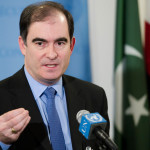European Union humanitarian aid to refugees from conflicts in the African Great Lakes area is responding to the challenges but there are some weaknesses in the way the aid is managed, a new report from the European Court of Auditors indicates.
The auditors, who examined the European Commission’s humanitarian support to Uganda, the Democratic Republic of Congo (DRC), Rwanda, Burundi and Tanzania for the period between 2011 and 2015 amounting to about €300 million, said more information is needed from the UN and its partner agencies as to how the money is spent.
‘The budgets examined were not detailed enough and there were no assessments of whether the proposed costs were reasonable. About half of the EU aid was spent through UN agencies and when the UN sub-contracted its activities no data was made available on how much was actually spent on the beneficiaries,’ a release by the Africa Press Organisation (APO) on behalf of the European Court of Auditors states in part.
Karl Pinxten, a member of the European Court of Auditors responsible for the report said: “I am concerned that the Commission does not have the figures it needs to check whether the aid is being delivered in the most efficient and economical way.
He added: “The more links there are in the chain between the EU taxpayer and those in need, the more difficult it becomes. The Commission should press UN agencies such as UNHCR and the World Food Programme, together with NGOs, for more information on how the EU’s money is being spent. Otherwise, this aid risks being too expensive.”
According to the auditors, there was a lack of documentary evidence to determine geographical priorities and assess project proposals, and as a result, it was not possible to determine whether the projects chosen complied with the relevant criteria and if the most appropriate projects were selected.
On a more global level, the auditors said there is no reporting on the Humanitarian Implementation Plan to provide an overview of results and lessons learnt.
‘While the desirability of linking relief, rehabilitation and development has been widely accepted by the Commission and other donors, there are very few examples of this being applied in practice. Without very actively pursuing this goal, there is a danger that opportunities to move from humanitarian aid to development aid will be missed,’ the auditors noted.








